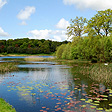BOYLE ABBEY
Magnificent Cistercian Ruins in County Roscommon
 Boyle Abbey, a medieval Cistercian monastery nestled in the town of Boyle, County Roscommon, Ireland, stands as a historical and architectural gem. Renowned for its beauty and distinctive stonework, the abbey was founded in 1161 by Saint Malachy (Máel Máedóc Ua Morgair), the Archbishop of Armagh, under the authority of the King of Connacht. Malachy, a disciple of Bernard of Clairvaux, established Boyle Abbey as a daughter abbey to Mellifont, Ireland's first Cistercian monastery.
Boyle Abbey, a medieval Cistercian monastery nestled in the town of Boyle, County Roscommon, Ireland, stands as a historical and architectural gem. Renowned for its beauty and distinctive stonework, the abbey was founded in 1161 by Saint Malachy (Máel Máedóc Ua Morgair), the Archbishop of Armagh, under the authority of the King of Connacht. Malachy, a disciple of Bernard of Clairvaux, established Boyle Abbey as a daughter abbey to Mellifont, Ireland's first Cistercian monastery.
 Construction of the abbey buildings spanned over the next half-century, culminating in its consecration in 1218. The completion was delayed by a conflict in 1202 over the succession to the Kingship of Connaught, during which the abbey was occupied and significantly damaged. Around 1220, Boyle became embroiled in 'The Conspiracy of Mellifont,' as Irish abbeys sought to break away from Norman control. Challenges arose, particularly concerning Cistercian practices such as the vow of silence. An official delegation from the mother order in France, sent to investigate, was disturbed by local habits but faced limitations in addressing the situation due to the distance.
Construction of the abbey buildings spanned over the next half-century, culminating in its consecration in 1218. The completion was delayed by a conflict in 1202 over the succession to the Kingship of Connaught, during which the abbey was occupied and significantly damaged. Around 1220, Boyle became embroiled in 'The Conspiracy of Mellifont,' as Irish abbeys sought to break away from Norman control. Challenges arose, particularly concerning Cistercian practices such as the vow of silence. An official delegation from the mother order in France, sent to investigate, was disturbed by local habits but faced limitations in addressing the situation due to the distance.
 The monastery followed the standard Cistercian plan, featuring a church on the north side, a rectangular cloister, a chapter house for monk meetings, and a kitchen and refectory. The abbey's cloister, however, suffered partial destruction when it was converted into a barracks in 1592 under Queen Elizabeth I, following the execution of the last Cistercian abbot, Galisne O’Cuilleanain, in Dublin in 1584. Boyle Abbey faced further challenges when besieged in 1645 during the Cromwellian conquest of Ireland in the English Civil War.
The monastery followed the standard Cistercian plan, featuring a church on the north side, a rectangular cloister, a chapter house for monk meetings, and a kitchen and refectory. The abbey's cloister, however, suffered partial destruction when it was converted into a barracks in 1592 under Queen Elizabeth I, following the execution of the last Cistercian abbot, Galisne O’Cuilleanain, in Dublin in 1584. Boyle Abbey faced further challenges when besieged in 1645 during the Cromwellian conquest of Ireland in the English Civil War.
 One of Boyle Abbey's most striking features is its depiction of the transition from Romanesque to Gothic architectural styles. In the former nave, the solid round arches of the earlier style and the pointed elegance of the later style stand in direct contrast, offering a clear visual narrative. The church, adorned with pointed arches and lancet windows, serves as a testament to the evolution from Romanesque to Gothic architecture. The east window, distinguished by tracery, stands out as a particularly notable feature. The cloisters, arranged around a central courtyard, showcase beautiful arched walkways adorned with intricate carvings.
One of Boyle Abbey's most striking features is its depiction of the transition from Romanesque to Gothic architectural styles. In the former nave, the solid round arches of the earlier style and the pointed elegance of the later style stand in direct contrast, offering a clear visual narrative. The church, adorned with pointed arches and lancet windows, serves as a testament to the evolution from Romanesque to Gothic architecture. The east window, distinguished by tracery, stands out as a particularly notable feature. The cloisters, arranged around a central courtyard, showcase beautiful arched walkways adorned with intricate carvings.
Visiting Boyle Abbey
Boyle Abbey typically opens its doors to the public from spring to autumn, with specific opening hours varying throughout the year. Situated on spacious and serene grounds next to the Boyle River, visitors can leisurely stroll through the gardens while appreciating the picturesque views. Knowledgeable guides offer insights into the abbey's architecture and religious significance. Additionally, the visitor center provides further information and exhibits related to the abbey's history and restoration. Boyle is located just north of Carrik-a-Shannon © Bargain Travel Europe
Find best travel deals in West Ireland at TripAdvisor
Find a deal at the Abbey Hotel Roscommon
Web
Info
Boyle Abbey
These articles are copyrighted and the sole property of Bargain Travel Europe and WLPV, LLC. and may not be copied or reprinted without permission.
SEE ALSO:
GIANT’S
CAUSEWAY - NORTH IRELAND
DRIVING
IRELAND - CAR RENTAL & TOUR ROUTES


